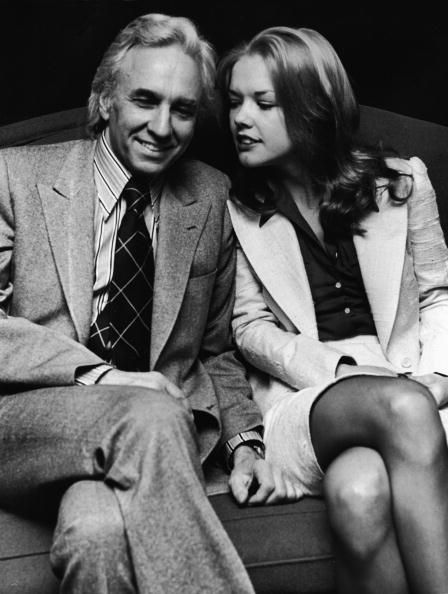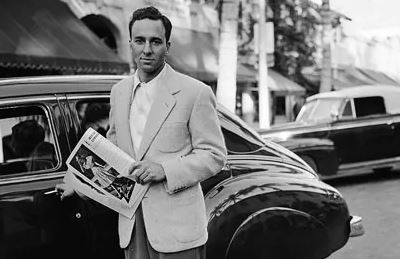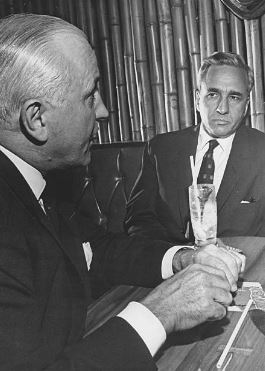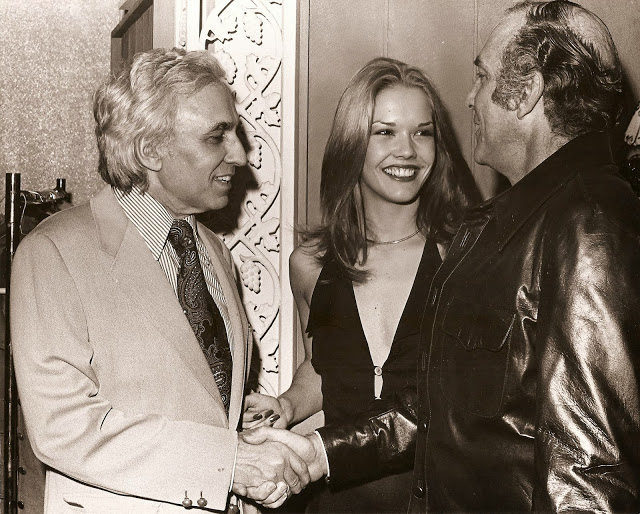George Huntington Hartford (he never used George) was the son of Edward V. Hartford, heir to the A&P fortune and auto parts inventor. His father died in 1922 and he was cared for by his mother Henrietta Guerard Hartford. Hartford came into 10 percent of the company at age 11 after the death of his father, Edward, who had made his own multi-million dollar fortune as an inventor and manufacturer of automobile components. When his mother, Henrietta, died in 1948, she left him $4-million dollars and her jewelry. At 21, Hunt inherited a fortune said to be "The greatest fortune on Earth", the money was made by his grandfather from a chain of 15,000 supermarkets and until 1965, the world's largest retail empire. In the 1930s the fortune brought in an income of $1.5-million dollars a year for the young heir. By 1940 the Securities and Exchange Commission ranked the Hartford's among the richest families in America. That had been largely the doing of young Huntington's two hard-working uncles George and John Hartford. His own father, Edward, considered himself a more creative, independent type, and in fact did very well for himself with a patented shock absorber for automobiles, accumulating a fortune on his own of more than $200-million dollars.
In the 1950s the A&P chain was the world's largest grocer and next to General Motors, A&P sold more goods than any other company in the world. Although he owned 10 percent of the giant supermarket chain, Hartford had no role in running the supermarket empire. Throughout a fifty year period, Hartford sank millions in business and cultural endeavors most of all which became failures. Huntington was the original owner and developer of Paradise Island in the Bahamas, which he bought in 1959 for $11-million dollars, and was originally called Hog Island. During the early stages of development, he failed to negotiate a gambling license for his new 52 room resort known as The Ocean Club. Hartford was told by the Minister of Tourism Sir Stafford Sands, that in order to get the license he would have to give up control of the island. He built a section of The Ocean Club from the unassembled stones of a 12th-century monastery that William Randolph Hearst had in a warehouse in Florida. Hartford eventually lost $40-million dollars in the deal and evidence would later suggest that Meyer Lansky was indirectly involved in the deal that eventually destroyed Hartford's biggest dream. In the 1960s, the International Herald Tribune wrote that he was one of the world's richest men. He was so rich that he even lent money to banks. In 1961 Hartford started Show Magazine, a lavish, high-gloss monthly that was supposed to recapture the elegance and wit of the original Vanity Fair. The new magazine folded for the first time in 1964, costing him $8-million dollars even before it was briefly and unsuccessfully revived in the early 1970s. Show ceased operations for the final time in 1973. By 1974, garnishing his record of persistent futility, he had lost another $7.4-million on a modern-art gallery he had built in Manhattan. Hartford also came up with the idea of the automated parking garage. Known as "Speed Park", the Manhattan garage experiment failed and lost $1.8-million dollars. He was for a brief time chairman of a shale-oil company, opened a handwriting institute and tried to open a European style cafe in New York's Central Park before New York City Parks Commissioner, Robert Moses axed the idea. Huntington lost $750,000 on the project. In an early issue of Show Magazine Hartford wrote "I have tried to use my millions creatively", "The golden bird, coming to life, has sometimes wriggled out of my hand and flown away".
In his long heyday, Mr. Hartford frequently turned up in the company of movie stars like Lana Turner and Gene Tierney. When it came to his four marriages, though, he chose each time a beautiful young woman of no fame or fortune, continued having well-documented affairs regardless, and, after each split, seemed to maintain affection for the ex-wife. In later years, Hartford lived on the last of his millions from a trust that was administered for him. He filed for bankruptcy in U.S District Court in Manhattan in 1992. His final home was in Lyford Cay, The Bahamas, where he lived with his daughter Juliet Hartford. Besides Juliet, Mr. Hartford was survived by his son, John. It has been calculated that he spent between $450-million to $500-million dollars of his inheritance. In 2008 Bloomberg.com estimated it as high as $1-billion dollars.
∼Huntington Hartford, 97, American businessman and philanthropist.
George Huntington Hartford (he never used George) was the son of Edward V. Hartford, heir to the A&P fortune and auto parts inventor. His father died in 1922 and he was cared for by his mother Henrietta Guerard Hartford. Hartford came into 10 percent of the company at age 11 after the death of his father, Edward, who had made his own multi-million dollar fortune as an inventor and manufacturer of automobile components. When his mother, Henrietta, died in 1948, she left him $4-million dollars and her jewelry. At 21, Hunt inherited a fortune said to be "The greatest fortune on Earth", the money was made by his grandfather from a chain of 15,000 supermarkets and until 1965, the world's largest retail empire. In the 1930s the fortune brought in an income of $1.5-million dollars a year for the young heir. By 1940 the Securities and Exchange Commission ranked the Hartford's among the richest families in America. That had been largely the doing of young Huntington's two hard-working uncles George and John Hartford. His own father, Edward, considered himself a more creative, independent type, and in fact did very well for himself with a patented shock absorber for automobiles, accumulating a fortune on his own of more than $200-million dollars.
In the 1950s the A&P chain was the world's largest grocer and next to General Motors, A&P sold more goods than any other company in the world. Although he owned 10 percent of the giant supermarket chain, Hartford had no role in running the supermarket empire. Throughout a fifty year period, Hartford sank millions in business and cultural endeavors most of all which became failures. Huntington was the original owner and developer of Paradise Island in the Bahamas, which he bought in 1959 for $11-million dollars, and was originally called Hog Island. During the early stages of development, he failed to negotiate a gambling license for his new 52 room resort known as The Ocean Club. Hartford was told by the Minister of Tourism Sir Stafford Sands, that in order to get the license he would have to give up control of the island. He built a section of The Ocean Club from the unassembled stones of a 12th-century monastery that William Randolph Hearst had in a warehouse in Florida. Hartford eventually lost $40-million dollars in the deal and evidence would later suggest that Meyer Lansky was indirectly involved in the deal that eventually destroyed Hartford's biggest dream. In the 1960s, the International Herald Tribune wrote that he was one of the world's richest men. He was so rich that he even lent money to banks. In 1961 Hartford started Show Magazine, a lavish, high-gloss monthly that was supposed to recapture the elegance and wit of the original Vanity Fair. The new magazine folded for the first time in 1964, costing him $8-million dollars even before it was briefly and unsuccessfully revived in the early 1970s. Show ceased operations for the final time in 1973. By 1974, garnishing his record of persistent futility, he had lost another $7.4-million on a modern-art gallery he had built in Manhattan. Hartford also came up with the idea of the automated parking garage. Known as "Speed Park", the Manhattan garage experiment failed and lost $1.8-million dollars. He was for a brief time chairman of a shale-oil company, opened a handwriting institute and tried to open a European style cafe in New York's Central Park before New York City Parks Commissioner, Robert Moses axed the idea. Huntington lost $750,000 on the project. In an early issue of Show Magazine Hartford wrote "I have tried to use my millions creatively", "The golden bird, coming to life, has sometimes wriggled out of my hand and flown away".
In his long heyday, Mr. Hartford frequently turned up in the company of movie stars like Lana Turner and Gene Tierney. When it came to his four marriages, though, he chose each time a beautiful young woman of no fame or fortune, continued having well-documented affairs regardless, and, after each split, seemed to maintain affection for the ex-wife. In later years, Hartford lived on the last of his millions from a trust that was administered for him. He filed for bankruptcy in U.S District Court in Manhattan in 1992. His final home was in Lyford Cay, The Bahamas, where he lived with his daughter Juliet Hartford. Besides Juliet, Mr. Hartford was survived by his son, John. It has been calculated that he spent between $450-million to $500-million dollars of his inheritance. In 2008 Bloomberg.com estimated it as high as $1-billion dollars.
∼Huntington Hartford, 97, American businessman and philanthropist.























